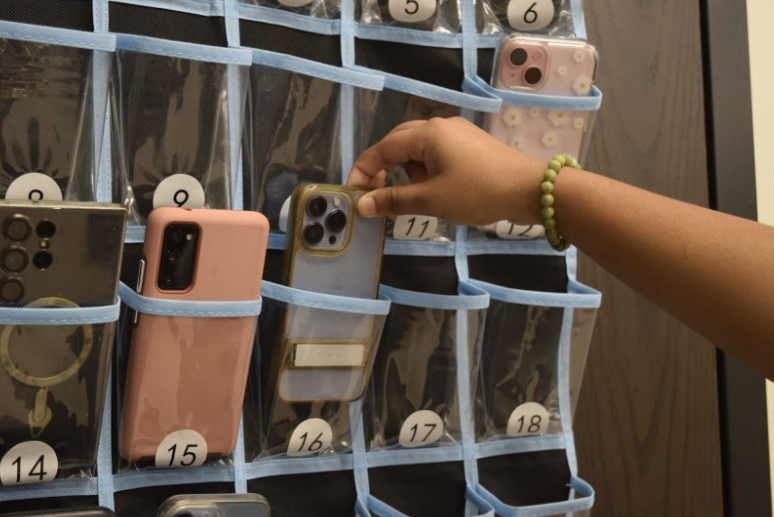With the pressure of success on every student’s back, it’s sometimes hard to imagine that inner peace can exist. Looming college decisions and selective scholarships are just the beginning; the state of the world is currently in jeopardy because of a mindset that should cease to exist: zero-sum thinking. The zero-sum attitude can be summarized as an outlook on life that believes one person’s gain equals another person’s loss.
“People who believe in the zero-sum game are hindering their ability to succeed. Everyone works at different paces, but at the end of the day, we are all approaching the same line. In America, there are some [socioeconomic] barriers put in place, but you determine what you’re doing and what you will make of yourself,” Diplomacy Club president and junior Amelia Geistler explained.
With college acceptance rates in decline, especially for elite universities, students are becoming more competitive with their college admission portfolios. Students compete for officer positions in clubs or extracurriculars to edge out their peers, but not because they are interested. Due to the toxicity of such competition, students should avoid completing activities only to get a leg up on their competitors.
“We’ve had students at West High and across the nation who have ambitions to hold positions within organizations for the sake of padding the resume — to say ‘I was president of this and vice president of this’. I don’t agree with that. It should not be happening,” college and career counselor Chris Lorenz said. “Kids shouldn’t have intentions like that, but if they do, they should follow through with the charge.”
If students adopt a more open-minded attitude, they will surely reap the benefits, as it is a clear demonstration of working together rather than working apart. Besides clubs and programs at schools, there is often a gruesome competition for the valedictorian position. Competitions that detriment a student’s mindset provoke a zero-sum mindset that can contribute to increased toxicity.
“To have a valedictorian, a school would have to rank students based on GPA. Parkway West High School moved away from a ranking system. High schools in the St. Louis area [observed] that the specific ranking of students was creating unjust motivations amongst the student body. The [valedictorian] system was guiding students in unhealthy directions, academically. It wasn’t necessarily in the student’s best interest in the end,” Lorenz said.
At the college level, specifically for most “Power 5” universities, almost five times as much money is allocated to student-athletes versus regularly admitted students, creating a substantial disparity. This is an issue in the zero-sum lens largely because universities are seen to be prioritizing athletics over academics due to the notion that athletes will make more money for their school. All it takes is a wider view to truly understand the importance of equality and fairness in school environments. Officials should be equally distributing resources for the mutual benefit of all students. Magic can be created in the kitchen or the lab, not just on the football field.
“It comes down to circumstance, but I think success can always be shared. There is always an abundance of opportunities out there, so I don’t necessarily think that if one person is successful, then it’s going to demote another person,” Indian Club president and senior Puneeta Ganga said.
Outside of academia, the zero-sum attitude is often applied to the socioeconomic divide between the rich and the poor. It’s easy to believe that the growth of the rich takes away from those on the lower end of the economic scale, but that isn’t the case. There are systemic barriers, such as racial disparities in wealth and income, that exacerbate poverty and inequality, creating a clear divide. Investing in programs for less privileged people— disability assistance, social security, workforce development, and education — can be vital to creating the change the world needs. The curb-cut effect, for example, demonstrates that funding one group or one substantial issue ensures mutual benefit across a population. This ideology should replace zero-sum thinking for it can apply to a plethora of high school and societal situations.
Creating a culture of collaboration to ease the strains of these issues is the only solution to overcome the zero-sum mindset and create an equitable future for all. High schools can foster a collaborative community of students by introducing activities such as icebreakers, team-building exercises and reflective learning opportunities into the curriculum.
“As a staff, we do a good job of having those one-on-one conversations and [getting] everyone involved. We have organic conversations with students and try to develop student-staff relationships,” Lorenz said.
The zero-sum fallacy has created global disruption because countries often choose to act for personal benefit rather than mutual benefit. When examining climate change, poverty and war, nations should choose to work together to solve issues and engage in diplomatic relations. Transparency between countries is a key tool for problem-solving. The Paris Agreement, for example, pushes countries to report on mitigation, adaptation, and finance, with the final goal of limiting global warming.
Looking back, a common set of values and resolutions helped to ease the global tensions of the Second World War, specifically through the Marshall Plan, which acted as a helpful aid to European countries. Now, the United Nations acts as a common ground for representatives around the world. When considering conflicts like the Israel-Palestine war or the Russia-Ukraine war, diplomacy must be the first choice to resolve conflict. Countries must abandon the zero-sum mindset for the much-needed benefit of their populations.
“I’ve never been a big fan of war. I’ve never thought it got anywhere. If you look at literally any war, it doesn’t go anywhere. It doesn’t work. It doesn’t have to be violent all the time. There are treaties, agreements, and declarations [nations] can sign to solve conflict diplomatically,” Diplomacy Club member and junior Neeka Naghibi Harat said.
Worldwide, people must abandon the zero-sum mindset. Adopting a collaborative approach is the only solution to battle the many issues that threaten global security. Individuals can start by believing in themselves and the people around them. Sharing joy in success and loss is a key component of peace and growth. The zero-sum mindset has many inherently bad consequences, but the worst thing it has done is create further division among people. To bring people together again, individuals must leave this attitude behind.
“You can’t compare yourself to other people because everyone has different circumstances. I don’t like thinking that if someone succeeds, you automatically fail because that seems very toxic. You can be happy about other people’s success; it doesn’t make you a failure,” Harat said.



![Senior Dhiya Prasanna examines a bottle of Tylenol. Prasanna has observed data in science labs and in real life. “[I] advise the public not to just look or search for information that supports your argument, but search for information that doesn't support it,” Prasanna said.](https://pwestpathfinder.com/wp-content/uploads/2025/10/DSC_0073-2-1200x800.jpg)
![Junior Fiona Dye lifts weights in Strength and Conditioning. Now that the Trump administration has instituted policies such as AI deregulation, tariffs and university funding freezes, women may have to work twice as hard to get half as far. "[Trump] wants America to be more divided; he wants to inspire hatred in people,” feminist club member and junior Clara Lazarini said.](https://pwestpathfinder.com/wp-content/uploads/2025/05/Flag.png)
![As the Trump administration cracks down on immigration, it scapegoats many immigrants for the United States’ plights, precipitating a possible genocide. Sophomore Annabella Whiteley moved from the United Kingdom when she was eight. “It’s pretty scary because I’m on a visa. When my visa expires next year, I’m not sure what’s going to happen, especially with [immigration] policies up in the air, so it is a concern for my family,” Whiteley said.](https://pwestpathfinder.com/wp-content/uploads/2025/05/DSC_0077-7copy.jpg)
![Shifting global trade, President Donald Trump’s tariffs are raising concerns about economic stability for the U.S. and other countries alike. “[The tariffs are] going to pose a distinct challenge to the U.S. economy and a challenge to the global economy on the whole because it's going to greatly upset who trades with who and where resources and products are going to come from,” social studies teacher Melvin Trotier said.](https://pwestpathfinder.com/wp-content/uploads/2025/05/MDB_3456-1200x800.jpg)



![Some of the most deadly instances of gun violence have occurred in schools, communities and other ‘safe spaces’ for students. These uncontrolled settings give way to the need for gun regulation, including background and mental health checks. “Gun control comes about with more laws, but there are a lot of guns out there that people could obtain illegally. What is a solution that would get the illegal guns off the street? We have yet to find [one],” social studies teacher Nancy Sachtlaben said.](https://pwestpathfinder.com/wp-content/uploads/2025/01/DSC_5122-1200x800.jpg)


